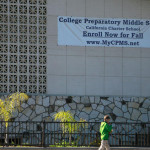Head-Trauma Cases Eyed As ‘Tidal Wave’ Headed To Courts
Lawsuits, Legislation On Tap As California Charter Schools Keep Attracting Students

About one-fifth of students in the San Diego Unified School District have turned to charters such as College Preparatory Middle School, above. The district expects that figure to climb. (Misael Virgen / San Diego Union-Tribune)
The Los Angeles Times has a detailed report from the front lines of the Golden State’s public charter schools battles, noting that “… twenty-five years after the California Charter School Act allowed public money to fund charter schools, which can be privately run and are often not unionized, advocates across the county and the state are waging legal and legislative fights. These disputes have led to tense relationships in districts that are scrambling to recoup the thousands of students who have sought alternatives.
Some numbers in the report: In the 2008-09 academic year, 38,680 students attended 73 charter schools in San Diego County. This year, 69,685 students are enrolled in 124 charters. But with growth comes questions.
San Diego County has emerged as a sort of Ground Zero for the California schools debate, although Los Angeles has its share of lawsuits as well.
Read the well-researched report here: Inside the fight against California’s charter schools
Colorado Has Longest Immigration Court Delay: 933 days, 9K cases pending
Colorado Public Radio is reporting that the Mile High State “… now has the longest delays in the nation for immigrants trying to have their cases heard before an immigration judge. The average waiting period is 933 days, and there are 9,420 cases pending.”
The network asks Denver immigration attorney Jennifer Casey to explain the situation while noting that it “… could get worse given the immigration-crackdown rhetoric in this political campaign season.”
Her initial comment: “If you look at the immigration courts over the last three years in Colorado, what we’ve seen is a reduction by about 50 percent of the immigration judges here locally. So we went from six judges in 2013 and we’re now down to three judges in 2016.”
The attorney also offers some background: “So, 50 percent reduction in immigration judges, 20 percent increase in cases and then the third factor is that the immigration courts nationally have prioritized certain cases above other cases. So we’ve got a priority docket and those are individuals who have entered the U.S. recently, specifically since May of 2014, who are either unaccompanied children or families with children. Mostly we’re talking about women and children but not exclusively.”
Of course, she also notes that the long delays benefit those with weaker cases to remain in the United States while hurting those with the better cases, because they cannot get a court date to win legal status.
– See more at: Why Denver’s Immigration Court Has The Longest Hearing Delays In The US
CM Publisher Posts Veteran’s Asbestos Plight On HuffPo
Courts Monitor Publisher Sara Warner has posted to The Huffington Post about how asbestos cancer policy impacts U.S. veterans. She notes that “… every year, hundreds or even thousands of American veterans who thought they survived military service discover that they were wrong; exposure to asbestos was a mortal wound that took decades to surface, evolving into the much-advertised mesothelioma, a terminal cancer.
She adds that “… both sides also agree that the government under which those vets served excludes itself from the resulting accountability, at least in the U.S. courts. What they do not agree upon is how to fix it, and the resulting debate has left veterans taking sides.”
Read the post here: http://www.huffingtonpost.com/sara-warner/a-sad-truth-for-veterans_b_9417622.html
Judge Says Toddlers Can Grasp Law, Represent Themselves

A child of migrant workers in Five Points, Calif. Judge Jack Weil says his comments on youths defending themselves in immigration court were “taken out of context.” (Photo Credit: Brian van der Brug / Los Angeles Times Report, 3/6/16)
A federal immigration judge in Virginia, who helps train other such judges, is making headlines for asserting that even toddlers can defend themselves in court without counsel. The Los Angeles Times is among those quoting from a court transcript that is part of an ACLU case: “I’ve taught immigration law literally to 3-year-olds and 4-year-olds. It takes a lot of time. It takes a lot of patience,” Judge Jack Weil said. ‘They get it. It’s not the most efficient, but it can be done.'”
The LAT duly notes that “… in immigration court, there is no guarantee of counsel for adults or children. Advocates for immigrants have long argued that a person’s ability to make informed decisions — and their chances of being allowed to stay in the U.S. — are enhanced if an attorney represents them.”
The story also offers this context: “A total of 20,455 unaccompanied youths were caught at the border from October through the end of January, more than double the number during the same period the previous year, which also saw an increase over the year before that, according to U.S. Customs and Border Protection. Youths started streaming in large numbers across the border illegally during the summer of 2014.”
Read the fallout here: http://www.latimes.com/nation/immigration/la-na-immigration-judge-20160306-story.html
High-Profile Civil Lawsuit Sours 100th Anniversary of the National Park Service
Courts Monitor Publisher Sara Warner has written about some of the controversies plaguing the National Park Service in its 100th anniversary year. Everything from sexual harassment by NPS Grand Canyon river guides (complete with up-skirt photography charges and withholding food for sex), to the Office of Inspector General compelling National Park Service Director Jon Jarvis to receive monthly ethics training for the rest of his career, to a contract dispute with a former long-time concessionaire is souring what was to be a year-long victory lap by the NPS. It’s at The Huffington Post here: For Parks Service, Yosemite Re-naming Is Latest Shock In 100th Birthday Year.
California Ruling Allows ‘Default’ Homeowners To Sue Over Foreclosure

Experts said it’s highly unlikely that former homeowners could unravel their foreclosures and win back their houses. Above, advocacy group Alliance of Californians for Community Empowerment holds a news conference in Carson in 2012. (Photo Credit: Allen J. Schaben / Los Angeles Times)
In a landmark decision, the California Supreme Court has ruled that some former homeowners can sue for wrongful foreclosure even if they were in default on their loans. A Los Angeles Times story quotes Katherine Porter, a law professor at UC Irvine and a former monitor for a national settlement over foreclosure abuses: “They opened the courthouse doors.”
During the recent home foreclosure crisis, tales of “robo-signing” emerged when employees of mortgage firms signed off on foreclosure documents even though they had no authority to do so. Troubled borrowers were often bounced around to various employees who gave different answers. The court ruled, in effect, that homeowners facing the resulting chaos may have been wrongly evicted – previously, courts had ruled that those people had no standing because they were in default on their loans.
It remains unclear how many people will be effected, but experts told the Times that it might be tens of thousands. California now joins other states where such challenges are allowed, including Ohio, Massachusetts and Texas. Read the Times story here: http://www.latimes.com/business/la-fi-foreclosure-ruling-20160302-story.html
Thousands in St. Louis land in ‘debtor prisons’ for not paying a court fee
Dallas Newspaper Reports From ‘Chaos’ Of Backlogged Immigration Court
 The Dallas Morning News has an important new report on the U.S. Immigration Court backlog, highlighting the case of a Korean man who “… has been in America long enough to raise two sons and run a family-owned doughnut shop in Irving. After years of worrying, he thinks he’s about to find out his fate. Things look promising. But [the judge] sets a merit hearing for Dec. 6, 2017.”
The Dallas Morning News has an important new report on the U.S. Immigration Court backlog, highlighting the case of a Korean man who “… has been in America long enough to raise two sons and run a family-owned doughnut shop in Irving. After years of worrying, he thinks he’s about to find out his fate. Things look promising. But [the judge] sets a merit hearing for Dec. 6, 2017.”
Reporter Dianne Solis makes the point that the man is “… caught in an immigration court system that is bursting with huge caseloads and stressed by a seemingly endless shortage of judges. The U.S. immigration court backlog is at a record 474,000 cases — nearly triple the number from a decade ago. The average case now takes two years to wind through the courts. Some can take five.”
One interesting think is that the report notes that the Immigration Court backlog “annoys both the political left and right. U.S. Rep. Jack Ratcliffe, R-Heath, called it a ‘de facto amnesty’ at a recent congressional hearing. Immigrants live in the U.S. for years waiting to find out whether they can, well, live in the U.S.”
But, the report continues, “… Democrats complain that the courts need more money to operate smoothly. The nation’s immigration courts have long functioned like an orphaned child of the immigration system. The courts’ budget equals about 2 percent of total federal funding for immigration law enforcement this fiscal year. Underfunding the courts ‘undermines justice,’ U.S. Rep. Sheila Jackson Lee, D-Houston, said at the same hearing.”
The DMN also backgrounds that Immigration Court is civil, so there’s no guarantee of an attorney as their would be in criminal court. That’s important because, Solis notes, “… an unrepresented immigrant has a greater chance of losing, of being ordered removed from the U.S. That came into harsh light recently with the surge of Central American mothers with children. In a study by the Transactional Records Access Clearinghouse, a Syracuse University nonprofit, of such cases, about a quarter of those who were represented by attorneys were allowed to stay in the U.S. Only 1.5 percent of those who didn’t have attorneys were allowed to stay.”
The story is basically an indictment of the whole Immigration Court process with the only good point being a promise of more judges soon if certain things work out.
Read it here: Chaos, backlogs straining immigration courts
